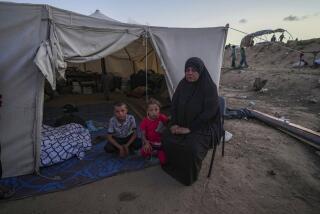Poll on Right of Return to Israel Provokes Furor
- Share via
RAMALLAH, West Bank — Dozens of furious Palestinian refugees wrecked a local pollster’s office on Sunday to stop him from releasing a survey showing that most Palestinian refugees were ready to abandon claims to return their former homes in what is now Israel.
Dozens of refugees pelted Palestinian academic Khalil Shikaki with eggs when they burst into his office, overturning tables and smashing windows, moments before he was to release the results of his controversial survey.
Shikaki, whose think tank monitors the Palestinian political pulse through periodic surveys, found that “the vast majority” of refugees were willing to accept monetary compensation in lieu of a return to homes and land they abandoned or were forced to flee when Israel was established in 1948.
“This is a message for everyone not to tamper with our rights,” one angry refugee said as others trashed the offices of Shikaki’s Palestinian Center for Policy and Survey Research.
Palestinian police intervened to calm tempers, but Shikaki, his shirt stained by egg yolk, aborted the news conference he had called to announce the results of his survey.
Shikaki had earlier told reporters that his poll found that most refugees scattered across the Middle East would be prepared to accept compensation and a new life in a Palestinian state and did not expect to return to their former homes.
About 700,000 Palestinians became refugees when Israel was established in 1948. Their numbers have swelled to more than 4 million living in refugee camps in the West Bank, Gaza Strip, Jordan, Syria and Lebanon.
The refugees and many Palestinians publicly say there can be no peace with Israel until Israel recognizes the refugees’ right of return.
Few Palestinian politicians have been prepared to suggest the refugees waive the right of return.
One official, Sari Nusseibeh, lost popularity among Palestinians when he suggested that the right of return was not realistic.
In another development Sunday, Palestinian Prime Minister Mahmoud Abbas called on Israel to let Palestinian Authority President Yasser Arafat travel freely, even as Israeli leader Ariel Sharon lobbied for his further isolation.
Israel and Washington are concerned that Arafat is trying to weaken the peace efforts of Abbas, who came under further pressure when militants threatened to abandon a truce he negotiated if Palestinian forces went ahead with a campaign to disarm them.
In a joint statement faxed to Reuters in Beirut on Sunday, Hamas and Islamic Jihad said an attempt to “disarm the resistance ... will make us think seriously of going back on our initiative of halting military attacks” against Israel.
Palestinian Information Minister Nabil Amr said talks would be held with militants to ensure that the truce, called on June 29, held.
“We will clarify our policy concerning weapons,” Amr said without elaborating. “I do not think there is any justification for abandoning the issue of truce.”
Abbas has said he wants to avoid any confrontation with the militants that could lead to civil war, favoring dialogue to keep the peace instead.
Sharon flew to Britain for a three-day visit, during which he planned to discuss with British Prime Minister Tony Blair the need to isolate Arafat in order to foil attempts to undermine Abbas, a senior Israeli official said.
Arafat said he had withstood previous Israeli attempts to isolate him and would withstand this one as well.
Abbas, a moderate and reformer, became prime minister earlier this year following pressure from the United States, which has sidelined Arafat, accusing him of fomenting violence in a 33-month-old Palestinian uprising. He denies it.
Palestinian officials say Arafat is trying to weaken Abbas, viewing him as too soft on Israel when it comes to implementing reciprocal measures required by a U.S.-backed peace “road map” en route to Palestinian statehood by 2005.
Elsewhere in the West Bank, Israel arrested an Irish suspected bomb maker and questioned him on the extent of his contact with Palestinian militants, Israeli security sources said.
More to Read
Sign up for Essential California
The most important California stories and recommendations in your inbox every morning.
You may occasionally receive promotional content from the Los Angeles Times.












